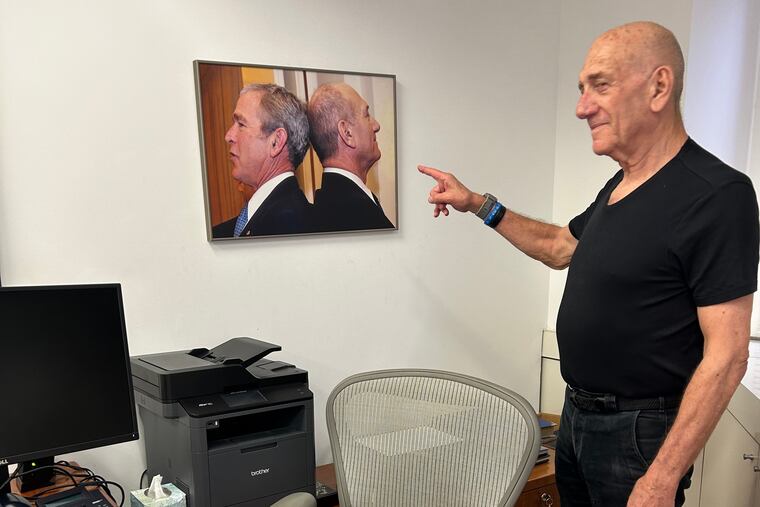Can Ehud Olmert’s two-state plan be revived?
The one-time Israeli leader views a peace settlement as a strategic move in Israel’s self-interest.

On the wall of the office of former Israeli Prime Minister Ehud Olmert is a photograph of three Israeli F-15 fighter jets piloted by children of Holocaust survivors, in a flyover above the Auschwitz concentration camp. The ceremony, in 2003, was meant to display how the Jewish people have triumphed over great adversity.
Among the other memorabilia in his Tel Aviv office is the control stick of an F-16 given to him by Israeli pilots who bombed a clandestine Syrian nuclear reactor in 2007.
The Israeli leader, who held office from 2006 to 2009, exudes pride in the current strength of the Jewish state. He also has strong feelings about what Israel needs to do to end the conflict with the Palestinians: revive a version of the two-state peace plan he put forward to Palestinian President Mahmoud Abbas in September 2008.
The Olmert plan was the most forthcoming offer any Israeli leader ever made to the Palestinians. He famously showed Abbas a detailed map of a potential Israeli withdrawal from around 94% of the West Bank plus Gaza, which together would have become a demilitarized Palestinian state.
Clusters of Israeli settlements would have been absorbed into Israel in ceded territory near the 1967 border. In return, Palestinians would have received equivalent territorial swaps. Arab neighborhoods in East Jerusalem would have become the Palestinian capital, and the holy places inside the Old City would have been administered by an Arab-Israeli consortium.
Abbas said he needed to consult his team on the proposal but never returned with a response. Olmert, who was facing corruption charges, soon tendered his resignation, and the proposal became moot.
“Abbas knows he made a terrible mistake,” Olmert told me regretfully. “He never said no, but in politics, you have to say yes.”
Olmert insists “there is no other solution” but two separate states. “We are reaching a point where we will be compared with the apartheid regime that led the civilized world to boycott South Africa,” he said bluntly. “Time is running out, and the threat is real.”
Moreover, the one-time Israeli leader views a peace settlement as a strategic move in Israel’s self-interest, arguing that “A political arrangement with the Palestinians is more crucial to our national security than another few kilometers of land.”
Olmert also believes Israel, which is now a major regional power with several Arab allies, must make the first move. “We have the power, the strength, not them [the Palestinians],” he told me. “There has to be an Israeli government in Israel saying, ‘This is what we are going to do,’ like what I proposed. But there is not an Israeli government willing to do it.”
Certainly not the current government of Benjamin Netanyahu, about which he is scathing. “This government doesn’t want to make peace. It won’t make any effort to make peace,” he said with barely controlled anger.
That, of course, is the first obstacle to Olmert’s vision. But one also must ask if there is a Palestinian partner willing to accept his 2008 offer redux, given Abbas’ bolt and the downhill slide in Israeli-Palestinian relations since then.
Olmert insists Abbas was a serious partner, unlike his presidential predecessor Yasser Arafat, and still believes he would have gotten a pact had he not had to resign. He also argues that there are other present and future Palestinian leaders up to the challenge, but “if I give their names, they will be burned.”
We may never know if Olmert is correct. I agree in principle about the continuing need for a two-state solution. Yet I fail to see how any Israeli government can remove hundreds of thousands of settlers from the West Bank, many of them violent.
And I don’t see any current Israeli leader from any party with the guts and conviction to take the risk Olmert did.
I hope I am wrong.